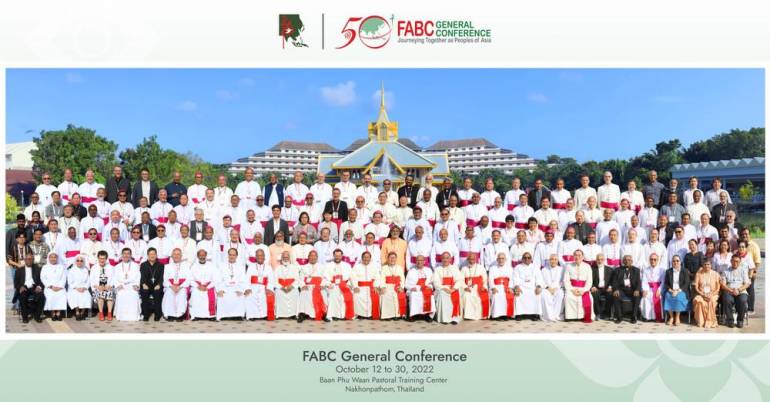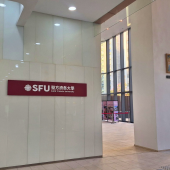FABC Recognizes emerging challenges, need for secular expertise to face them | Part 1

The Federation of Asian Bishops Conference (FABC) saw at its 50th general conference the challenges the Church in Asia faces today and the need for people of expertise to confront them.
The conference's final document, ‘Journeying Together as Peoples of Asia,’ has identified several issues, such as digital technology issues; gender issues, the evolving role of women in societies; migrants, refugees, and indigenous people; climate issues the promotion of an equitable economy in the wake of urbanization and globalization.
The prelates said, "Like the Magi, we Bishops, gathered at the FABC 50 General Conference, sought human guidance in the person of experts - sociologists, environmental experts,
Economists, political scientists, theologians, psychologists, lawyers, activists—persons who can lead us to a better comprehension of the emerging realities on the continent."
The Magi, the bishops said in the [Bangkok Document], did not only look up to heaven; they also looked around seeking counsel.
The prelates said they did a lot of looking up and around, hoping that it could give them "the appropriate optic in viewing our current situations in Asia, a perspective that is both human and divine."
Digital technology
The Asian bishops have recognized both the positive and negative impacts of digital technology. They saw it could be used to threaten personal security, spread disinformation, incite hate, and more.
The bishops noted that the owners of digital platforms, especially social media, set the rules.
"They have control over the narratives they allow to circulate," the prelates said.
The bishops have also seen governments and corporations exploiting social media platforms to "exert power" and "influence culture."
"What is truly heart-rending is the digital divide that is emerging between those who have access to the Internet-based services (educational, financial, government, religious) and those who don’t. The rapid progress in the area of artificial intelligence also presents new challenges to the human person. All these warrant our attention as we move into newer digital and virtual worlds."
An equitable economy in the Face of Urbanization and Globalization
Globalization has brought the world together, the bishops said. Nations could come to the aid of those struck by natural calamities.
"On the other hand, it has divided the world," the prelates said. "The gap between the rich and the poor has widened. Far from becoming an inclusive world that embraces all, in the name of development, millions of people have been excluded."
"Money-profit-market seems to be the determining economic thrust today," the bishops went on. "With greed for more wealth, the globalizing forces are appropriating the resources of the poor and unjustly exploiting their labor. All this is affected in the name of development, progress, and growth."
They echoed the words of former Indian Prime Minister Manmohan Singh.
We '"have learned how to bring about growth, but we have yet to achieve comparable success in inclusiveness."'
Echoing the words of St. John Paul II in his Address to the Pontifical Academy of Social Sciences, the Asian bishops said, "The Church will continue to work with all people of goodwill to ensure that the winner in this process will be humanity as a whole, and not just a wealthy elite that controls science, technology, communication and the planet’s resources to the detriment of the vast majority of its people. The Church earnestly hopes that all the creative elements in society will cooperate to promote globalization, which will serve the whole person and of all people."
The climate crisis
The prelates have also identified climate change, which they have described as man-made, as a long-term challenge currently affecting the lives of millions of people across the continent.
"Countless people in Asia are already suffering due to weather extremes, drought, typhoons, deforestation and forest fires, and conflicts over water use," they said. "Water availability has direct consequences on the food supply. Given that Asia is home to many countries vulnerable to climate change, millions of people already suffer due to rising sea levels, air, soil, and water pollution, the “throwaway mentality,” the loss of biodiversity, and waste management. All of these are crimes against nature and future generations."
In his Laudato Si encyclical, Pope Francis stated that only when the sufferings of nature and victims of the climate crisis were turned into personal experience would people renounce "unsustainable capitalistic models of production and simultaneously take seriously necessary measures to reform our lifestyles."
Migrants, refugees, and indigenous people
The prelates have also acknowledged the right of people to migrate for a greener pasture. But they pointed out that migration has a damaging impact on underdeveloped countries.
"This continuous migration of professionals, like nurses, doctors, caregivers, architects, and engineers, to other countries cannot but aggravate the situation of underdevelopment in their home countries."
The bishops said that Asia has a booming migration industry, legally and illegally. Migration could disrupt family life, children's abandonment, and social fabric erosion.
"For some countries, the migrants’ remittances greatly contribute to their economy. This accounts for the policy of governments of some developing countries encouraging workers to go to other countries to the detriment of their own countries’ development. While the migrants send home their hard-earned money and help their economies, hardly any money is invested by the home governments for the benefit of the migrant workers themselves, some of whom even had to sell their land to be able to work abroad."
The documented and proven abuses and exploitations were concrete proofs that slavery still existed in the 21st century, the bishops noted.
"We think especially of Indians, Filipinos, Pakistanis, Bangladeshis, and Sri Lankans living as contract workers in the Gulf States or the more industrialized countries of Asia. Often, they are treated like undesirable aliens, despite the fact that they contribute to the economies of their host cities and countries. Many of them, separated from their families, struggle with loneliness. In their struggle to cope with homesickness, some are entangled in extramarital relationships resulting in complicated family situations."
The bishops also expressed concern for the thousands of people displaced by the ongoing civil war in Myanmar and armed conflicts across Asia.
Fleeing their own country to avoid the fighting, political refugees could end up as illegal aliens in another country, hiding from immigration authorities for fear of getting deported.
"Being undocumented and having no legal status, many are exploited as cheap labor without any social benefits and are unable to avail of public services, such as education and health care."
Read the entirety of the FABC 50 Bangkok Document by clicking the following link: FABC 50 Bangkok Document
Radio Veritas Asia (RVA), a media platform of the Catholic Church, aims to share Christ. RVA started in 1969 as a continental Catholic radio station to serve Asian countries in their respective local language, thus earning the tag “the Voice of Asian Christianity.” Responding to the emerging context, RVA embraced media platforms to connect with the global Asian audience via its 21 language websites and various social media platforms.














